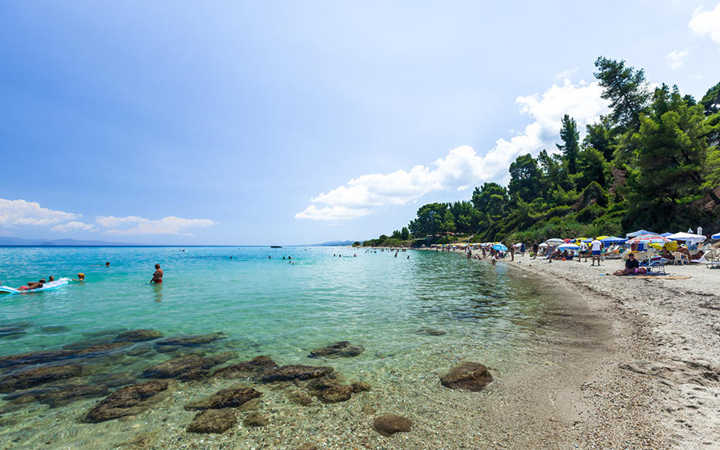The name means "cold spring." It's a small settlement (pop. 500) about 90km from Thessaloniki, and 5km south of Kallithea, on Kassandra's east coast. It's about a kilometer inland from the beach. Its elevation, at 120m, gives you a nice view of the surrounding area, and its farms and pine forests, and of the waters of Toroneaos Bay to the east.
There are plenty of places to stay in Kriopigi, and the beach really isn't that far away; about a 10-minute downhill walk. The village has tavernas, banks, and a health clinic.
What's really nice about this somewhat out of the way place is its Blue Flag beach: the brilliant blue-green waters of the bay is fringed by a long, sandy, and in places sand mixed with rocks, beach. Behind the beach the extensive greenery of the area tumbles down to the sand's edge. There are umbrellas and sun beds for rent.
There is a terrific campground at Kriopigi, where you can pitch a tent or park a camping trailer among the trees and have, in most cases, an unobstructed view of the water, which makes the campground long and narrow, as it follows the shoreline.
A couple kilometers west of Kriopigi there are remains of a Roman-era villa in an area known as "Old Castle.(Paliokastro)."
Kriopigi was home to a well-known military figure during the Greek War of Independence (1821). Stamatios Kapsas, known as "Captain Kapsas," organized fighters from throughout Halkidiki after the outbreak of hostilities, and led the insurrectionists to victory in several instances early on in the conflict. With 2,000 men, they won a victory over the Turks just east of Thessaloniki, and the city looked forward to Kapsas's deliverance of the city. A statue in his honor has been raised at the city's northeastern entrance, despite the fact that his efforts to free Thessaloniki failed. Thessalonians would have to wait another 90 years for the Ottomans to leave, in 1913. On June 10th, 1821, Kapsas died along with 67 of his compatriots fighting a rearguard action near the Agios Anasatsias monastery near the mountain village of Vasilika, 20 km southeast of Thessaloniki. There is a large monument in his honor just outside the monastery.











